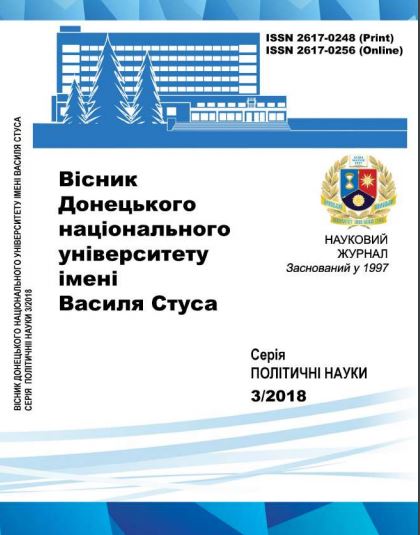Classification of political crisis and its major characteristics.
DOI:
https://doi.org/10.31558/2617-0248.2018.3.1Keywords:
political crisis, types of political crises, classification of political crises, constitutional crisis, national crisisAbstract
The article is devoted to the analysis of the typology of political crisis and its main characteristics. The novelty of the study is developed classification model of the political crisis, based on an analysis of key developments of researchers in political and economic sciences, branches of psychology and conflict science. The author analyzes the works of foreign authors concerning the classification of political crises. For the first time a detailed classification of political crises based on the investigated material is proposed. Classification of political crises is carried out depending on whether the crisis covers the whole political system or only one of its parts, leads to the improvement, strengthening, stabilization of the political system or its transformation and destruction. The duration of the political crisis is also, ultimately, determined by the nature of the political system, its ability to cope with destructive processes and modernize. The article highlights crises-revolutions, crises-shock, crises-destruction and crisis-perturbations, differing in terms of the spread of crisis processes in society and the depth of defeat of the institutional political system. Socio-communicative component identifies identity crises, crisis of legitimacy, crisis of political participation, crisis of penetration and distribution crisis. In addition, the crisis has been classified by scale, intensity, nature of origin, nature of consequences and duration. The need to understand the typology of crises is proved for improving the effectiveness of crisis management and crisis forecasting as well as for a deep analysis of the problem of the political crisis, for the search for solutions to the current political crisis in Ukraine. It is concluded that the diversity of political crises is due to the multifunctionality and diversity of the work of state power, and its dependence on the human resource, which is represented by a large number of groups of stakeholders.
References
Чекменёва Т.Г. Политические кризисы: понятие и типология, 2016. – [Електронний ресурс]. – Режим доступу: http://vadim-galkin.ru/politics/policy/politicheskie-krizisy-ponyatie-i-tipologiya/
Дэна Д. Преодоление разногласий: как улучшить взаимоотношения на работе и дома : пер. с англ. / Даниэль Дэна ; перевод М. И. Смольникова . – СПб.: Ленато,: Институт личности,: Палантир, 1994 . – 138 с.
Рапопорт А. Могут ли исследования мира быть прикладными? Перевод на русский язык: П. Цыганков. Теория международных отношений: Хрестоматия. – М., 2002. С. 203-213.
Медушевский А.Н. Конституционные кризисы в обществах переходного типа // Вопросы философии. – 1999. №2. – С. 3-21.
Глухова А.В. Политические процессы и политические процедуры. Лекция 4. Политическая стабильность и политические изменения. Уч. пос. по политологии. – Воронеж: Издательство Воронежского университета, 2000. С.72-23.
Сапа Н. В. Теоретико-методологічні засади механізмиантикризового державного управління / Н. В. Сапа // Гуманіт. вісн. ЗДІА. – 2009. – Вип. 38. – С. 106-116.
Пушкарева Г.В. Политические кризисы: содержание, виды и факторы эскалации // Вестник Московского университета. Серия 21: Управление (государство и общество). – 2016. – № 1. – С. 140-164.

